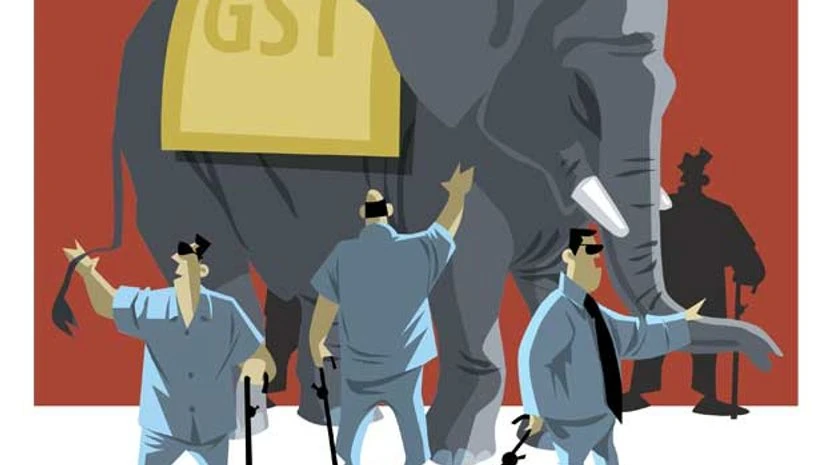Even as the government sticks to its April 1, 2017, target to roll out Goods and Services Tax (GST), Indian companies are barely ready to undergo technology upgradation that is needed for them to comply with the new taxation regime.
GST will be rolled out through the Good and Service Tax Network (GSTN), the IT backbone of the entire concept, which provides common registration, return filing and e-payment services to the taxpayers. With GSTN, all the filing will be done online.
At present, companies have to file as many as 495 forms, annexures and challans – which cover value-added tax (VAT), central sales tax, service tax and central excise – in order to file returns. Once GST rolls out, this will come down to 19 forms, challans and annexures.
However, to be able work with the new system, large companies will need to overhaul their internal software systems so as to be able to communicate with GSTN. This means that firms would need to generate invoices that are compatible with the new software requirements.
Read our full coverage on the GST Bill and its impact
Read our full coverage on the GST Bill and its impact
“Broader industry wanted this as GST would improve ease of doing business. Industry is looking for clarity on rates as GST gets rolled out. There does not seem to be worry about preparedness. Industry is not worried about this. It is rather worried about implementation,” said Kris Gopalakrishnan, co-founder, Infosys. He said that the industry might not be ready yet (technically) for GST.
Also Read
“Industry will worry about internal systems soon and the services industry will have new set of issues since they don't have issues related to states now,” he added.
Analysts said that companies will need to either upgrade or re-configure their systems which are involved in executing transactions.
“Any (software) system where a transaction is happening will get impacted and will have to be updated or reconfigured. At present, they are configured to work on various taxes like excise, state entry taxes, VAT, service tax and various other cess and local taxes, so the way they calculate and create invoices is different. Also, the prices are calculated based on these taxes, most of which are non-creditable or not fungible. With GST coming in, the underlying logic will change as all taxes will be fungible and creditable. The taxes will include CGST (central GST), SGST (state GST) and IGST (integrated GST). So, the entire system will need to be reconfigured,” said Rituparno Mukhopadhyay, executive director (technology consulting), PwC India. “At a macro level, ERP (enterprise resource planning) systems and accounting systems used by the companies at present will get 100 per cent impacted. Systems running finance module, procurement and supply chain module and sales module will have to get reconfigured,” added Mukhopadhyay.
Companies at large have barely started identifying and putting together the technical requirements for being ready for GST implementation. At present, companies are undergoing the process of understanding the impacted areas and that will take at least six to eight weeks, said analysts.
“The companies are assessing their technical foot prints and mapping all that needs to be changed,” said Neel Goyal, partner (advisory services), EY India. "It will take about five to seven months for them to be (GST) ready. The next six to eight weeks are crucial for the industry, as they need to get started if they want to be ready by the time GST rolls out," added Goyal.
"Most of the companies have put together a team to assess where and what would be the impact on their business in terms of supply chain, systems and taxation. As the law becomes more clearer and the details become clearer at the granular level, the companies will move from impact assessment to designing the solutions that can be opted," said Mukhopadhyay.
The investments on the technology upgrades would vary for companies, depending upon the size of the company, complexity of the information technology (IT) systems and which sector it belongs to, analysts said.
The process is even more complex for multinational companies, said experts, as the ERP systems hosted by these companies will need to be able to talk with the GST portal, in addition to coordinating with their ERP systems globally.
While several companies have begun work to identify changes required in their systems in order to adapt to GST, at the same time, software providers are also working on enhancing their ERP versions to make them GST compliant, said Goel.
Mukhopadhyay said that the final solution can come only when the tax rules from the central GST and the state GST become clearer.
However, according to analysts, micro, small and medium enterprises remain the area of concern where the knowledge percolation level may be low and so will be the execution.
In a presentation in March, GSTN CEO Prakash Kumar said that the government was working on development of GST ecosystem. It involved supporting companies having accounting software products where additional functionalities could be added to enable GST filing requirements, companies providing easy solutions for digitally signing the returns/invoice data and companies which will provide functionalities to taxpayers through their portals, apps or offline tools to enable GST filing requirements.
"To be sure that companies can communicate with the GSTN easily, GST portal will not be the only place to upload returns, but it will allow companies to use third party-provided tools. GSTN is also providing application programming interfaces to IT companies to come up with tools enabling invoice level data from accounting software itself," Kumar said.

)
